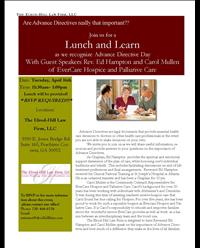|
Thursday, July 16, 2015
 July is Sandwich Generation Awareness Month. The Sandwich Generation refers to those people, mostly in their mid-40’s to late 50’s, who are caring for aging parents as well as caring for young children or dependent young adult children. If you are the meat or peanut butter in that sandwich, you might be looking for help from your siblings or other family members. One of the best ways to plan the care for an aging or disabled family member is by holding a family meeting. The meeting is designed to do many things: get information from the aging or disabled person about their needs, figure out what kind of care is needed and brainstorm about ways to find that care, gauge the financial resources available for care, and assign duties to various family members so that one caregiver does not get burned out. Read more . . .
Friday, February 28, 2014
What is a Fiduciary and why does the VA want to appoint one for my dad?
George, a veteran of WWII who now lives in an assisted living facility, applied for Improved Pension with Aid & Attendance. After a few months, the VA sent him a letter explaining that George had been awarded the Pension, but would not receive his retroactive check until the VA determined whether he was competent to handle his affairs and whether the VA should appoint a fiduciary to manage his checks. What is a Fiduciary and why does the VA want to appoint one for my dad?
George, a veteran of WWII who now lives in an assisted living facility, applied for Improved Pension with Aid & Attendance. After a few months, the VA sent him a letter explaining that George had been awarded the Pension, but would not receive his retroactive check until the VA determined whether he was competent to handle his affairs and whether the VA should appoint a fiduciary to manage his checks.
Often veterans or their surviving spouses applying for VA Pension or Compensation benefits have some mental disease or injury that affects their ability to manage their financial affairs. Read more . . .
Wednesday, February 19, 2014
What happens to my Facebook page after I die?
A few weeks ago, I received a request to send a birthday greeting to a deceased Facebook friend. This friend has been dead for several years now, but her Facebook page remains active. While I feel happy to be reminded of her every year, it feels a little creepy to be asked to wish her a happy birthday.
Have you ever thought about what happens to your "digital assets" after your death? Who can read your e-mails after your death? How will someone pay the online bills if you are incapacitated? Who gets your iTunes or Kindle books?
What if you have an online store or an e-bay or PayPal account that is worth some money? Will anyone even know what accounts you have?
There is no legal definition of "digital assets", so for the purposes of this article we will say that digital assets are files that are stored on a person's computer or on a server, and online accounts.
We can divide digital assets into five categories:
- Devices and data, such as computers, iPhones and the documents stored on them
- Electronic mail, including message received and continued access
- Online accounts which require usernames and passwords
- Financial accounts which are usually linked directly to banking and other financial institutions
- Online business, such as online stores and blogs which may have the potential for streams of revenue
Traditional laws regarding ownership, and agency and probate laws generally dictate the rules about control of assets during life and the disposition of property at death. Read more . . .
Friday, November 29, 2013
 Most of us know someone who served in the military at some point in time. We’ve seen pictures of them in uniform posted on their walls, or we’ve heard them talk about when they were in Korea, or Viet Nam, or Fort Benning.
Today, there is a lot of anxiety about healthcare costs, education costs, and long-term care costs. Have you ever asked someone who served in the military whether they are receiving any benefits or have thought about receiving benefits? Often veterans or their families will say, “When my dad came back from the war, he never wanted to talk about the war and the VA just reminded him of a really bad time in his life. “ Or, my dad visited a VA hospital and it was too confusing and overwhelming for him. Read more . . .
Wednesday, April 3, 2013

Are you prepared if a tragedy strikes making you or a loved one go to the hospital?
Fortunately we have the right to make our own decisions when it comes to our healthcare, but what if that ability was taken away? How will you and your loved ones wishes be protected? The solution: Advance Directives.
Advance Directives are legal documents stating your wishes for the doctors and rest of your healthcare team to follow when you are unable to make decisions for yourself. During critical times, these documents can make a world a difference.
In recognition of Advance Directive Day on April 16th, our firm will be hosting a Lunch and Learn.
Lunch will be provided and we are honored to have guest speakers Reverend Ed Hampton and Community Outreach Representative for EverCare Hospice Carol Mullen. We invite anyone to join to learn useful information, resources and receive answers to your questions on the importance of Advance Directives.
See attached flyer for more details. Lunch provided. RSVP REQUIRED!
Friday, January 4, 2013
Are you prepared if a tragedy strikes making you or a loved one is sent to the hospital? Fortunately we have the right to make our own decisions when it comes to our healthcare, but what if that ability was taken away? How will you and your loved ones wishes be protected? The solution: Advance Directives. Advance Directives are legal documents stating your wishes for the doctors and rest of your healthcare team to follow when you are unable to make decisions for yourself. During critical times, these documents can make a world a difference
To learn more about the importance of an Advance Directive clink on the link below:
http://seniorcarecorner.com/health-care-decisions-dnr-advance-directives Read more . . .
Wednesday, November 28, 2012
 There’s news abounding for 2012 coming from the Social Security Administration (SSA) including increases to the cost-of-living adjustment (COLA), a rise in what seniors pay for Medicare Part B, and new wage limits workers must meet before the Social Security tax of 6.2 percent stops as a deduction from paychecks. Here's how it works: By law, most Medicare enrollees can't be charged a Part B premium that produces a net reduction in Social Security benefits. Assuming the Social Security and Medicare percentages come in as forecast, this "hold harmless" feature would protect seniors with Social Security benefits of $625 or lower, according to SCL. Seniors with higher benefits would see a small inflation raise. Read more . . .
Monday, November 26, 2012
The Internal Revenue Service (IRS) is increasing the amount taxpayers can deduct from their 2013 taxes as a result of buying long-term care insurance. Premiums for “qualified” long-term care insurance policies (see explanation below) are tax deductible to the extent that they, along with other unreimbursed medical expenses (including Medicare premiums), exceed 7.5 percent of the insured’s adjusted gross income. This threshold is rising to 10 percent on January 1, 2013, although it will remain at 7.5 percent for taxpayers 65 and older through 2016. Read more . . .
Monday, January 9, 2012
Each year, I make a list of goals that I want to accomplish for the year. Some years, the goals have a theme – unfortunately, the theme is almost always the same: lose weight, exercise more… This year, I’m challenging you to make one of your New Year’s goals to get your estate planning affairs in order. This is one goal that is easy to accomplish – I promise! Here are 5 easy steps you can take to accomplish this goal. - Get educated about estate planning. Attend an estate planning workshop or two.
Read more . . .
Tuesday, December 20, 2011
On Friday night, we gathered with neighbors old and new to celebrate a cherished tradition – our annual progressive dinner. Traditionally, we begin the year. We find out about the new babies, weddings and graduations to come. We learn what colleges the children will attend, and where soon-to-be college graduates will start their careers. We also check in on aging neighbors to find out about their health scares, their difficulties, the loss of their loved ones. After moving from house to house for salads, and main courses, we end up with more wine and sweet treats to reminisce about dinners past. How many have we had? No one can remember. But by the end of the evening, we’re looking forward to next year’s dinner, and assigning tasks to make it happen.
Continuing this tradition is important to my family and my neighborhood because it allows us to connect with our neighbors, to get to know them when times are good so that we can help each other when times are not so good. Without our traditional yearly gathering, we might not realize when our neighbors need our help.
In my practice, I see many people who see their aging or ill family members and friends at the holidays and realize that all is not well. Sometimes, all has not been well for so long that those family members are now in crisis.
If you are visiting family members who are aging or ill, take the time to talk with them to find out about their health. Are they seeing a doctor? What medications are they taking? How do they keep track of their medications on a daily basis? Ask them if they have a healthcare proxy or advance directive for healthcare? Who will make healthcare decisions for them if they are not able?
Although it can be difficult to have a conversation with parents about their finances, ask them if they have appointed someone to make financial decisions for them if they are not able. Look around the house and see if there are stacks of unopened bills. Find out if they have long-term care insurance. Ask where their important financial and legal documents can be found. If they haven’t appointed anyone to make decisions for them, urge them to do that while they still can.
If your aging family members are still driving, ride with them to see if they are still able to drive safely. Are they stopping at the stop signs? Do they forget to look before making a turn? Do they still remember how to get to places they have been to many times before or do they forget where they are going? If they are having trouble driving, would a driving school help? Or, can you help them find transportation so they won’t need to drive anymore?
With married couples, try to talk with each one alone. Sometimes couples get so good at covering for each other, you don’t realize that one of them might be suffering from dementia. If one of the couple is ailing, find out how the well spouse is coping. Is he or she eating and sleeping right? Is he or she getting help in the home so he or she can get out to see friends, or just get some time to rest and recharge?
Look in the refrigerator, freezer and cupboard. Is the food in the refrigerator or cupboards moldy or out of date? Are they going to the grocery store on a regular basis? If you suspect that they are not eating right, is there a meals-on-wheels program that they might qualify for?
I hope that you will enjoy holiday traditions with family, friends, and neighbors this year. Will you take time to talk with your family and friends to see whether they might need help in the coming year?
Happy Holidays!
Patti Elrod-Hill
Sunday, December 4, 2011
Medicare changed things up a bit this year by scheduling open enrollment early. Because Medicare is in the news, I’ve been getting a lot of calls from clients to ask me about Medicare. While most people understand that they can become eligible for Medicare when they turn 65, they wonder about the types of Medicare plans available, and what plan they should choose. Today, we’ll talk a little bit about the basics of Medicare, and about how to choose a Medicare Part D prescription drug plan. Here is the basic Medicare alphabet: Medicare Part A covers hospital insurance that can help pay for inpatient care at hospitals, skilled nursing facilities, hospice, and home health care. Read more . . .
The Elrod-Hill Law Firm,LLC assists clients with Estate Planning, Veterans Benefits, Medicaid, Elder Care Law, Probate, Special Needs Planning and Pet Trusts in the North Atlanta area including the counties of Dekalb, Gwinnett and Fulton.
|

|
|
|